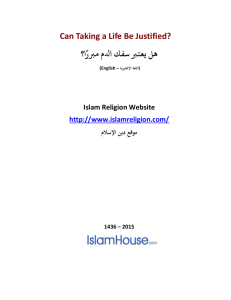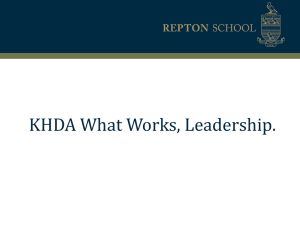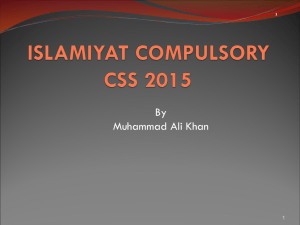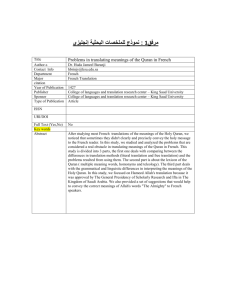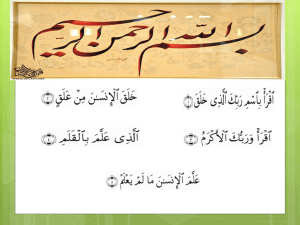Abstract - Educational Research International ISSN:2307-3713
advertisement
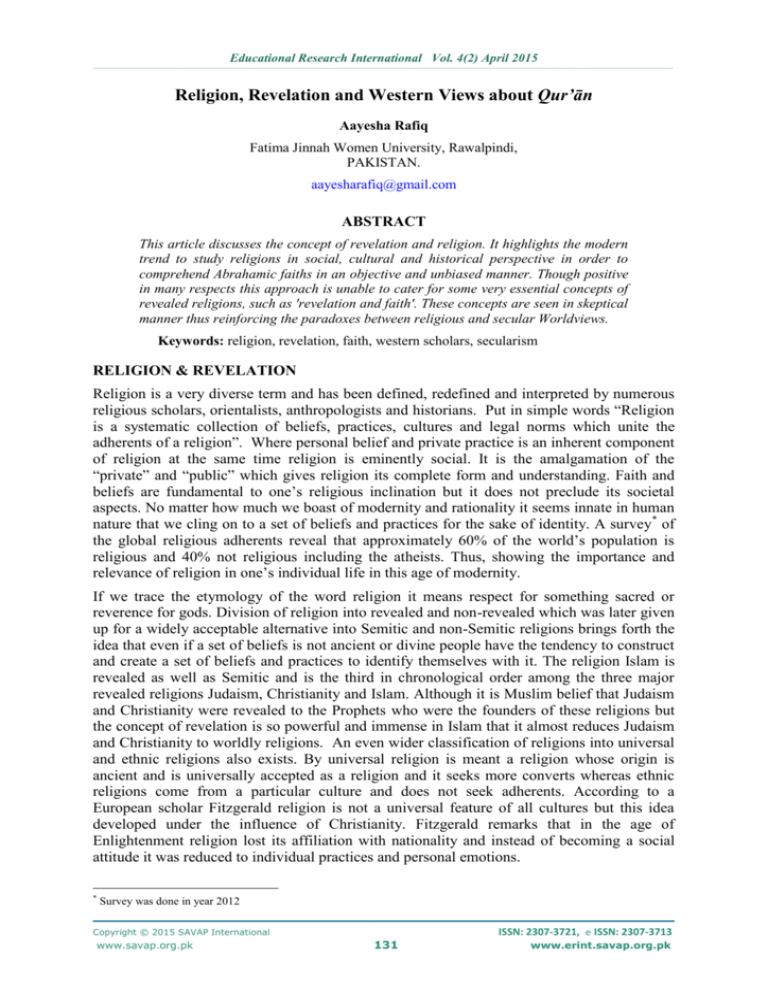
Educational Research International Vol. 4(2) April 2015 ____________________________________________________________________________________________________________________________________________________________________________________________________________________________________________________________________________________________________________ Religion, Revelation and Western Views about Qur’ān Aayesha Rafiq Fatima Jinnah Women University, Rawalpindi, PAKISTAN. aayesharafiq@gmail.com ABSTRACT This article discusses the concept of revelation and religion. It highlights the modern trend to study religions in social, cultural and historical perspective in order to comprehend Abrahamic faiths in an objective and unbiased manner. Though positive in many respects this approach is unable to cater for some very essential concepts of revealed religions, such as 'revelation and faith'. These concepts are seen in skeptical manner thus reinforcing the paradoxes between religious and secular Worldviews. Keywords: religion, revelation, faith, western scholars, secularism RELIGION & REVELATION Religion is a very diverse term and has been defined, redefined and interpreted by numerous religious scholars, orientalists, anthropologists and historians. Put in simple words “Religion is a systematic collection of beliefs, practices, cultures and legal norms which unite the adherents of a religion”. Where personal belief and private practice is an inherent component of religion at the same time religion is eminently social. It is the amalgamation of the “private” and “public” which gives religion its complete form and understanding. Faith and beliefs are fundamental to one’s religious inclination but it does not preclude its societal aspects. No matter how much we boast of modernity and rationality it seems innate in human nature that we cling on to a set of beliefs and practices for the sake of identity. A survey* of the global religious adherents reveal that approximately 60% of the world’s population is religious and 40% not religious including the atheists. Thus, showing the importance and relevance of religion in one’s individual life in this age of modernity. If we trace the etymology of the word religion it means respect for something sacred or reverence for gods. Division of religion into revealed and non-revealed which was later given up for a widely acceptable alternative into Semitic and non-Semitic religions brings forth the idea that even if a set of beliefs is not ancient or divine people have the tendency to construct and create a set of beliefs and practices to identify themselves with it. The religion Islam is revealed as well as Semitic and is the third in chronological order among the three major revealed religions Judaism, Christianity and Islam. Although it is Muslim belief that Judaism and Christianity were revealed to the Prophets who were the founders of these religions but the concept of revelation is so powerful and immense in Islam that it almost reduces Judaism and Christianity to worldly religions. An even wider classification of religions into universal and ethnic religions also exists. By universal religion is meant a religion whose origin is ancient and is universally accepted as a religion and it seeks more converts whereas ethnic religions come from a particular culture and does not seek adherents. According to a European scholar Fitzgerald religion is not a universal feature of all cultures but this idea developed under the influence of Christianity. Fitzgerald remarks that in the age of Enlightenment religion lost its affiliation with nationality and instead of becoming a social attitude it was reduced to individual practices and personal emotions. * Survey was done in year 2012 Copyright © 2015 SAVAP International www.savap.org.pk ISSN: 2307-3721, 131 e ISSN: 2307-3713 www.erint.savap.org.pk Educational Research International Vol. 4(2) April 2015 ____________________________________________________________________________________________________________________________________________________________________________________________________________________________________________________________________________________________________________ Whether the basis is universality, philosophy or ethnicity there emerge six major religions in the world: 1. Judaism, 2. Christianity 3. Islam 4. Hinduism 5. Chinese folk religion 6. Buddhism The first three among these are also termed as Abrahamic religions because it is believed that the Prophets who brought these religions were the descendants of Prophet Abraham. The remaining three do not owe their decent to Abraham. Judaism Judaism originated in ancient Israel and its primary source is Torah which is believed to have been handed down to Prophet Moses. Hebrew bible and Talmud are also considered to be the central texts of Judaism. Today the followers of Judaism are mainly settled in Israel and United States of America. Christianity Christianity is chronologically the second Abrahamic religion based on the teachings of Prophet Jesus and as stated in the New Testament. Christian faith believes Jesus to be the Son of God and the Savior of humanity. Christians unlike Jews are not concentrated in specific parts of the globe but are scattered throughout the world. It is further divided into Catholic, Protestant and Eastern Christianity. Islam Islam is the third of Abrahamic religions and was revealed on Prophet Mohammad in the 7th century CE. Primary text for Islam is the Quran and Prophetic traditions recorded in the second and third centuries of Islam. The two major divisions of Islam are Sunni and Shi’i Islam. It is most widely practiced in Asia and Africa. It is a modern trend to understand and study religions in historical, social and cultural perspectives. This trend was introduced by the Western world with an assumption that such an approach would conclude objective and unbiased understanding of Islam, Judaism and Christianity. The idea of belief and revelation thus does not hold any place of prominence in the contemporary studies of religions. The problem that Islam poses to the Western world is that its primary literature and historical facts strongly support the concept of revelation and prophecy and Muslim belief lends support to these conceptions. Concept of revelation is central to the Abrahamic religions. Revelation in religion means disclosing of some truth or knowledge through communication with some deity. In Abrahamic religions this term is used to refer to the process by which God’s will is revealed to human beings. Muslims even to this day have firm belief in the process of revelation and the revealed status of Quran the primary source of Islam. Even the words of Prophet Mohammad are considered to be revealed but a degree less than Quran and are termed as “Wahy Ghair Mutlu” (non-recited revelation). It was the age of Enlightenment about the middle of seventeenth century with the progress of materialism and belief in rationalism that the concept of revelation was to be seen in a skeptical manner. In the twentieth century some religious philosophers proposed that revelation held no content in itself. They held that Copyright © 2015 SAVAP International www.savap.org.pk ISSN: 2307-3721, 132 e ISSN: 2307-3713 www.erint.savap.org.pk Educational Research International Vol. 4(2) April 2015 ____________________________________________________________________________________________________________________________________________________________________________________________________________________________________________________________________________________________________________ revelation is a human response that records how we respond to God. It is Muslim belief that God revealed himself to Prophet Mohammad through angel Gabriel. The Quran is the final word of God and a revelation preserved in its original form for the humanity. According to Islamic literature, historical narratives and biographies of Prophet Mohammad it is believed that Quran was revealed on Mohammad at the age of forty. The medium through which these revelations were communicated to Mohammad was Angel Gabriel over twenty three years of his life. This is the time span during which entire Quran as revealed on Prophet Mohammad. Once the companion of the Prophet Harith bin Hishaam asked the Prophet how does wahy descend on you? The Prophet replied in following word, “Sometimes I listen to the sound like tinkling of the bell: this sound is one of the most difficult forms of revelation (wahy) that I have had to experience. When this process is over revelation is implanted into my memory and sometimes an angel appears in the form of a man.”† Prophet’s wife Aisha was witness to many revelations she said, “I have seen the coming of revelation (wahy) during the period of severe cold and his forehead used to be full of perspiration (in spite of such cold weather).” ‡ It is not only the modern Orientalists and scholars of the age of enlightenment who disregard revelation but the reaction of pagan Arabs towards wahy was not much different. They considered wahy as invented falsehood and fabricated. To them the Prophet was either insane or possessed by spirits. They used to say and is recorded in Quran in 43:31 in following words: And they said, "Why was this Qur'an not sent down upon a great man from [one of] the two cities?" The first revelation came down on the 15th of Ramadan in the 40th year of the birth of the Prophet Mohammad in cave Hira and was revealed in Arabic language. In the opinion of linguists the word Quran means to be read, proclaimed or recited. This is equally applicable to any surah or whole of Quran. The criticism of pagan Arabs was neutralized by the fact that the Quran was revealed in Arabic as the Prophet Mohammad was an Arab. If it was not so then the pagan Arabs could object about the nature of revelation its reference to the context, historical perspective and various details about surahs (Qur’anic chapters) interpretation. So they were surprised to see that the language of Quran and the Prophet who was Ummi (unlettered) was not rough and unrefined but eloquent and had depth in its meaning and expression. In the contemporary era since the age of enlightenment we find more or less same tenor and attitude prevails among the orientalists as was displayed by the pagan Arabs. WESTERN APPROACH TOWARDS THE STUDY OF QURAN The systematic order of Quran is rejected by western scholars like Palmer, Bell, Wansbrough, Noldeke and others. They claim that no order in Quran exists instead surahs (chapters) are merely scattered messages to become superfluous after the purpose of the verses had been met. In the words of John Burton, “The Prophet could not have had access to writing the revelations nor did he care for it during his mission.”§ † ‡ Sahih Bukhari, vol.1, p.2 Sahih Bukhari, vol 1, p.2, hadith no.2 Copyright © 2015 SAVAP International www.savap.org.pk ISSN: 2307-3721, 133 e ISSN: 2307-3713 www.erint.savap.org.pk Educational Research International Vol. 4(2) April 2015 ____________________________________________________________________________________________________________________________________________________________________________________________________________________________________________________________________________________________________________ Palmer says, “Apart from its preposterous arrangements, the Quran is not so much a Book as a collection of manifestos, diatribes, addicts, discourses, sermons and such like pieces.”** In reply to this criticism of the Orientalists it must be stated that Prophet Mohammad although himself an Ummi encouraged learning and writing and had scribes who used to record his revelations. Secondly Arabs were well known for their excellent memories and many had reduced the entire Quran to their memories and were thus preserved. Thus the Orientalist’s claim that Prophet did not take care of writing the Qur’anic revelation is incorrect. Orientalists have thus differed from the Muslim scholars regarding the systematic, textual and chronological order of the Quran. Most notable among these are Noldeke, William Muir, Jeffory and Rodwell. But it is an undeniable fact that Quranic surahs in their present sequence were recorded in writing under the personal supervision of Prophet Mohammad. The internal textual order of the verses in each Surah was set by the Prophet himself and whole ummah till now is strictly adhering to the same. About the thematic order of Quran, notwithstanding the criticism of Orientalists the unity of the Quran is astoundingly greater than any other religious or sacred scribe. This can only be accredited to the unity of Allah’s purpose and design. From human perspective following facts emerge: 1. The Prophet Mohammad was an Ummi 2. The Quran was revealed in different environments and different times 3. The Quran addressed the entire humanity irrespective of their grades and shades. One wondered about the miraculous revelations of Quran that it was revealed by one Originator (Allah) and one recipient (the Messenger). The Quran invites the attention of all human beings as mentioned in the following verse to explore and carry out research about Quranic revelations to find no discrepancy in any aspect of spirit, message and purpose. Verse 4:82 best explains this concept. Then do they not reflect upon the Qur'an? If it had been from [any] other than Allah , they would have found within it much contradiction.†† The study of Quran by the European scholars started with a different aim and a purpose for example Peter the Venerable (1092- 1156), an international figure from French origin was an associate of many religious leaders of his day constituted a team of scholars to come up with an intellectual encounter against Islam and Qur’anic teachings. He was in Toledo in the twelfth century and feared the spread of Islam and Muslim culture. Many Christian missionaries carried out various studies for interpreting Islam and Quran from Christian point of view to achieve following objectives: 1. Stop the spread of Islam in Eastern and Western Europe 2. Add appealing fillip in the teachings of Christianity The first Latin translation of Quran was produced in 1140 A.D. by Robert of Ketton, in this translation Quran was portrayed as the work of an enemy. Many other publications appeared § John Burton, The Collection of the Quran, (Cambridge: Cambridge University Press, 1977) p. 234. E. Palmer, The Koran with an Introduction by R. Nicholson (first published in 1880), Oxford University Press, 1928,Introduction. †† Al-Quran 4: 82. ** Copyright © 2015 SAVAP International www.savap.org.pk ISSN: 2307-3721, 134 e ISSN: 2307-3713 www.erint.savap.org.pk Educational Research International Vol. 4(2) April 2015 ____________________________________________________________________________________________________________________________________________________________________________________________________________________________________________________________________________________________________________ successively which condemned Islam and its adherents. The writings on Islam were polemical and pornographic literature was used to depict Muslim culture. The first Arabic text of Quran was published in 1530 in Italy and the first English translation of Quran by Alexander Ross appeared in 1649 A.D. Numerous other Orientalists such as George Sale, Wollaston, Muir, Lammens, Champion, Robinson, Menzes, Goldziher, Schacht, Wansbrough, Rippin and many others criticized Quran. These Orientalists insisted that Quran was composed by Mohammad and divine revelation completely. In Sale’s words: “That Mohammad was the author and chief contriver of Quran is beyond dispute although it be highly probable that he had no small assistance in his design from others.”‡‡ According to Norman Danial the Quran is the work of a few non-Muslims who plagiarized the New Testament and the Bible. It was also said that Quran was a piece of poetry. J.N. Anderson said that “Quran was the result of wishful thinking”§§ and Montgomery Watt said that “Quran was a product of creative imagination”.*** An interesting turning point is observed in the writings of Orientalists when trade and commerce increased between the Christians and Muslims. Now the need of the hour was not to have better relations with Muslim countries to have trade facilities they thus decided not to offend the feelings of Muslims and instead present such arguments which were acceptable to them. The new strategy that they adopted was to speak of the influence of the European world on Arab countries Muslims and their culture. They also realized that due to the rapidly increasing contacts between the Muslims and Christians books written by the Western world on Islam will now be sold in Muslim countries. Emphasis now turned from polemical writings to the idea of influence of Jewish and Christian sources on Quran rather than claiming that Quran was the product of Mohammad’s wishful thinking or a piece of poetry. Jews started to explore how Islam resembled Judaism and what Mohammad had taken from Christianity. Similarly Christian scholars sought that Christianity was the main source of Islam. They also went on to say that the Origin of the word Quran was nor Arabic but was Syriac and that some portion of Quran was eaten by a goat or that the last two surahs were not part of Quran were all baseless allegations according to the Muslim belief but the Orientalists have argued that they have taken up all these allegations from Islamic literature. Watt urged the Muslims and the non-Muslims to study Quran on new lines in the twentieth century. These new lines according to Watt will try to express the thoughts and conclusions of Western scholars in neutral language or tone but the truth of the matter is that they would not abandon their views about Islam and its two primary sources Quran and Hadith. ‡‡ George Sale, The Koran: Commentry called al Quran with a Prelimnary Discourse, London, 1734. J. N. Anderson, The World Religions, London, 1965, p.56. *** Montgomery Watt, Mohammad: Prophet and Statesman (Oxford: Oxford University Press,1961) P. 15 §§ Copyright © 2015 SAVAP International www.savap.org.pk ISSN: 2307-3721, 135 e ISSN: 2307-3713 www.erint.savap.org.pk Educational Research International Vol. 4(2) April 2015 ____________________________________________________________________________________________________________________________________________________________________________________________________________________________________________________________________________________________________________ REFERENCES [1] Anderson, J. N. (1965). The World Religions. London: Frank Cass. [2] Burton, J. (1977). The Collection of the Quran. Cambridge: Cambridge University Press. [3] Palmer, E. (1928). The Koran with an Introduction (By R. Nicholson). London: Oxford University Press. [4] Sale, G. (1734). The Koran: Commentary called al- Quran with a Preliminary Discourse. London. [5] Watt, M. M. (1961). Prophet and Statesman. Oxford: Oxford University Press. Copyright © 2015 SAVAP International www.savap.org.pk ISSN: 2307-3721, 136 e ISSN: 2307-3713 www.erint.savap.org.pk

